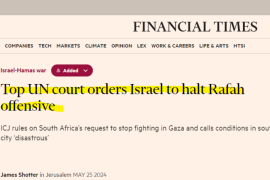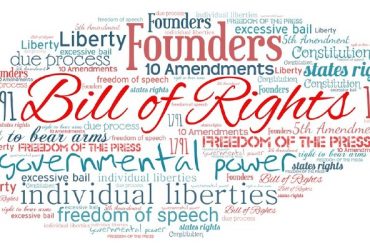Chris Phillips’ CiF piece, “Lebanon: Blair’s other Middle East mistake“, about Blair’s actions during the 2006 Lebanon war, quite predictably had no patience for “simplistic” views about Blair’s characterizations of Hezbollah (and their sponsor, Iran) as the cause of turmoil in the region:
From Blair’s perspective this religious struggle defines the Middle East. He states: “To me, you can’t understand Hezbollah unless you understand the role of Iran; or understand Lebanon unless you understand Syria … or understand either country in its present state unless you understand the history not just of the region but of the religion, how it saw itself, how it had developed its own narrative, how it saw its own predicament.”
This includes a remarkable simplification of the Israel-Palestine conflict, which he claims “is used as a potent source of friction and war because of religious difference”. The impact of other significant forces, notably…imperialism, are conveniently sidelined.
(Oh yes, of course, Western “imperialism” is the root cause of the conflict. How naive of me to think otherwise.)
There are very few places, other than the Guardian, that a “progressive’ could seriously doubt the nefarious influence of the Iranian sponsored Shiite terrorist group on Lebanon and the broader region.
Just for clarity, it should be noted that Hezbollah has been involved in the death of approximately three hundred Americans.
Further, as testimony to the U.S. Congress (by Jeffrey D. Feltman, Assistant Secretary, Bureau of Near Eastern Affairs, and Daniel Benjamin, Coordinator, Office of the Coordinator for Counterterrorism) in June, 2010, demonstrated:
While Iran continues to provide a significant portion of Hizballah’s funding, Hizballah has also broadened its sources of financial support in recent years. Hizballah is now heavily involved in a wide range of criminal activity, including the drug trade and smuggling. It also receives funds from both legitimate and illicit businesses that its members operate, from NGOs under its control, and from donations from its supporters throughout the world. Hizballah also has established its own commercial and communications networks outside the Lebanese legal system that in essence rob the Lebanese treasury of the tax revenues that would come via legitimate licensing, registration, and tax reporting.
…
Hizballah’s destabilizing actions also have a global reach. The recent conviction of a Hizballah cell in Egypt for spying, plotting attacks on resorts frequented by tourists, and arms smuggling illustrates Hizballah’s growing regional reach and ambitions. In Iraq, we are also aware of Hizballah providing training and other support to Shia militant groups. As of early 2007, an Iran-based individual by the name of Abu Mahdi al-Muhandis formed a militia group, employing instructors from Hizballah to prepare this group and certain Jaysh al-Mahdi Special Groups for attacks against Coalition Forces in Iraq. Hizballah’s web also extends to Europe and diplomatic missions abroad, where Hizballah planned to attack the Israeli Embassy in Baku. While this attack was foiled, and the perpetrators are now imprisoned in Azerbaijan, these actions illustrate the group’s continued disregard for the rule of law, both inside Lebanon and outside its borders.
…
Time and again, we have seen that Hizballah’s weapons and Syria’s support for its role as an independent armed force in Lebanon are a threat, both to Lebanon and Israel, as well as a major obstacle to achieving peace in the region. Hizballah exploits the ongoing Arab-Israeli conflict to bolster its own interests and influence. The group claims to maintain arms in order to defend Lebanon from Israeli “aggression” and derives much of its popularity from its image as a “resistance” group. In truth, Hizballah is actively using the conflict with Israel in order to gain regional popularity and justify its vast arsenal, acting as a point of leverage in the region for Iran. One of Hizballah’s rhetorical points regards Israeli overflights of Lebanese territory. The UN Secretary General has cited in his reports on UNSCRs 1559 and 1701 that these overflights are a violation of UNSCR 1701, a resolution which we are all committed to seeing fully implemented. Yet there is an unmistakable connection between these overflights and Hizballah’s blatant and ongoing efforts to evade the arms embargo that is the essence of UNSCR 1701; Hizballah’s activities create the very conditions that Hizballah then uses as a pretext to justify its own destabilizing behavior, putting Lebanon at severe risk.
…
Hizballah’s insistence on remaining armed, aggressive, and unaccountable threatens important American interests and goals – especially our interests in Middle East peace and regional security, in containing the spread of destabilizing weapons and terror financing, and in a strong, democratic, and independent state of Lebanon.
Quite naturally, the piece by Phillips’ elicited reader responses arguing that Israel, and not Hezbollah, was the real threat to regional peace:
And, of course, who is and is not a useful idiot for radical Islam is wholly subjective.











